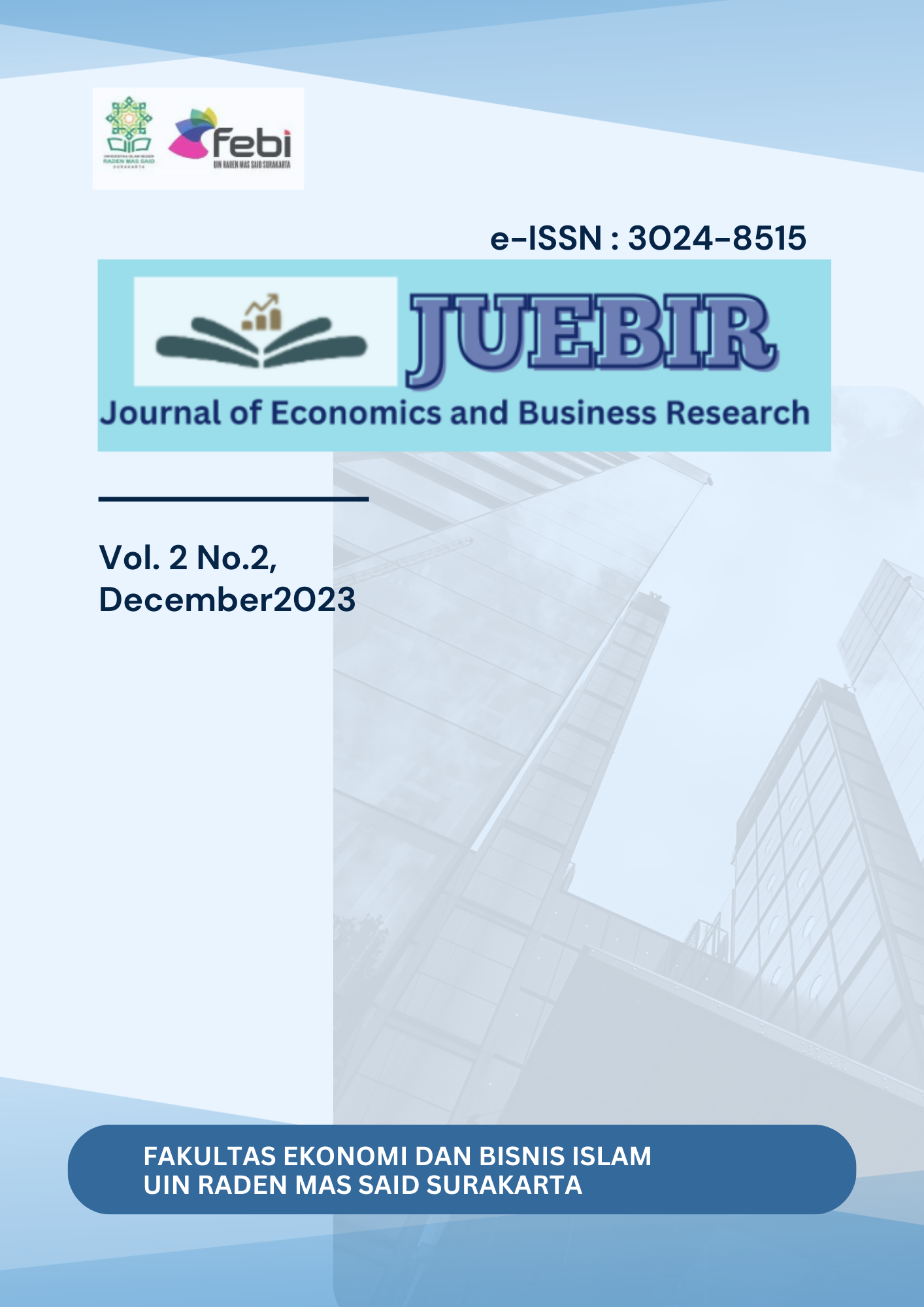Analisis Penerimaan Masyarakat Muslim Boyolali Terhadap Financial Technology Sebagai Alat Transaksi Elektronik
DOI:
https://doi.org/10.22515/juebir.v2i2.7865Keywords:
Fin-tech acceptance, user acceptance, fin-tech paymentAbstract
Financial technology (fintech) is a technological development in the financial sector since industrial revolution 4.0 begun. Fintech models is ranging from crowdfunding, peer to peer lending, investment management, payment, market aggregator. The paper argue that finctech is becoming daily lifestyle in urban area. The paper is tested acceptance of fintech as a payment method of 400 rural respondents Boyolali. By united theory of acceptance and use of technology, the study revealed that the variable values of performance expectations, social factors, facilitating conditions show an alpha value of less than 0.05 and the significance value indicates an adequate category, so the results show a relationship with user acceptance, while the effort expectation variable shows an alpha value of more than 0.05 and the significance value is included in the very weak category so that there is no effect on user acceptance. In the test results the moderating variable of experience can strengthen the relationship between social factor variables and conditions that facilitate user acceptance, but the moderating variable cannot strengthen the business expectation variable
Downloads
References
Alfredo Sitepu, J., Anggraeni Putri, S., Studi Sistem Infromasi, P., & Tinggi Manajemen Informatika dan Komputer Nusa Mandiri, S. (2019). Analisa Penerimaan Masyarakat Terhadap Fintech Sebagai Alat Transaksi Elektronik Menggunakan Metode Tam. Inti Nusa Mandiri, 13(2), 35–40. www.nusamandiri.ac.id
Aziz, F. A. (2020). Menakar Kesyariahan Fintech Syariah di Indonesia. Al-Manahij: Jurnal Kajian Hukum Islam, 14(1), 1–18. https://doi.org/10.24090/mnh.v14i1.3567
Handayani, T., & Sudiana. (2015). Analisis Penerapan Model Utaut ( Unified Theory of Acceptance and Use of Technology ) ( Studi Kasus : Sistem Informasi Akademik Pada Sttnas Yogyakarta ). Jurnal Angkasa, VII(2), 165–180.
Marginingsih, R. (2021). Financial Technology (Fintech) Dalam Inklusi Keuangan Nasional di Masa Pandemi Covid-19. Moneter - Jurnal Akuntansi Dan Keuangan, 8(1), 56–64. https://doi.org/10.31294/moneter.v8i1.9903
Mention, A. L. (2019). The Future of Fintech. Research Technology Management, 62(4), 59–63. https://doi.org/10.1080/08956308.2019.1613123
Muri, Y. (2017). Metode Penelitian Kuantitatif, Kualitatif & Penelitian Gabungan (Suwito (ed.)).
Pujihastuti. (2010). Isti Pujihastuti Abstract. Prinsip Penulisan Kuesioner Penelitian, 2(1), 43–56.
Raman, A., & Don, Y. (2013). Preservice teachers’ acceptance of learning management software: An application of the UTAUT2 model. International Education Studies, 6(7), 157–164. https://doi.org/10.5539/ies.v6n7p157
Rosmasari, R., Agus, F., & Ismail, I. (2021). Analisis Penerimaan Sistem E-Learning Menggunakan Metode Unified Theory of Acceptance And Use of Technology (UTAUT). Jurnal Rekayasa Teknologi Informasi (JURTI), 5(2), 199. https://doi.org/10.30872/jurti.v5i2.7071
Wicaksono, B. A., & Krisnadi, I. (2017). Analisis Pengembangan Strategi Bisnis Perusahaan Fintech Di Indonesia (Studi Kasus pada PT. Amartha Mikro Fintek). Nn, 1–9.
Winarto, W. W. A. (2020). Peran Fintech dalam Usaha Mikro Kecil dan Menengah (UMKM). Jesya (Jurnal Ekonomi & Ekonomi Syariah), 3(1), 61–73. https://doi.org/10.36778/jesya.v3i1.132














